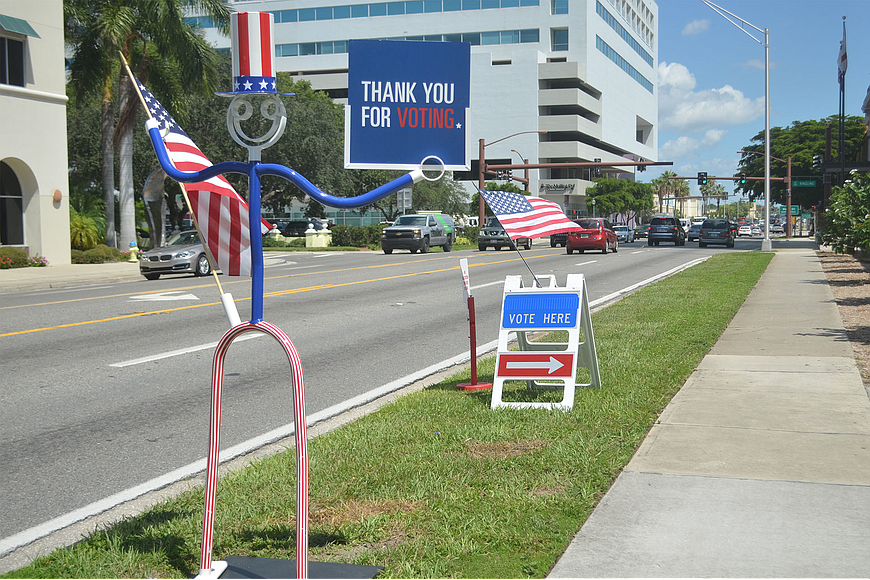- January 27, 2026
-
-
Loading

Loading

In 2007, 77.6% of city voters cast ballots in favor of a charter amendment that calls for the use of instant runoff voting in municipal races.
Although the amendment was adopted, the city never made the change to ranked-choice ballots — because the necessary technology wasn’t available. Now, at the request of the group Rank My Vote Florida, the city is considering taking legal action in hopes of removing regulatory obstacles to a new voting system.
On Monday, the City Commission voted 4-1 to partner with Rank My Vote Florida to seek a declaratory judgment that affirms local governments have the authority to use ranked voting for their elections.
A majority of the board supported the idea Monday, noting the electorate had codified a change to ranked-choice elections more than a decade ago.
“This went before the voters,” Commissioner Jen Ahearn-Koch said. “They voted for it overwhelmingly. It’s in our charter.”
But on Tuesday, Commissioner Erik Arroyo expressed a desire to revisit that decision despite his vote in favor of the legal challenge. As a result, the city has not made a final decision on the declaratory judgment, and the commission will discuss the topic again at a future meeting.
Ranked choice voting — or instant runoff voting, as it’s referred to in the city charter — is a form of balloting that allows voters to numerically rank candidates in order of preference. If no candidate receives more than 50% of the vote, the lowest-ranking candidate is eliminated from consideration, and votes are reallocated based on rankings. The process continues until one candidate reaches majority support.
David Angel, the general counsel for Rank My Vote Florida, said the group approached Sarasota officials because, due to the adopted charter amendment, the city is the only party in the state with standing to seek a declaratory judgment. The Florida Department of State office has said it will not certify a software tabulator for ranked-choice ballots because the state constitution prohibits it. But Angel said that prohibition does not apply to municipal elections.
Angel said the pursuit of a declaratory judgment that contradicts the Department of State’s stance is a low-risk proposition for the city. Rank My Vote Florida has offered to provide the legal argument and funding for the litigation.
“We do all of the legwork so there’s as little burden on staff as can be,” Angel said.
The city charter describes ranked choice voting as“an efficient and cost-effective process that fosters broad and diverse participation.” On Monday, proponents of the system advanced similar arguments. Angel said surveys and other analysis from places that have implemented ranked choice voting have shown satisfaction with the process among all demographics. He said the system would offer fiscal benefits, as the city would only have to hold a single election for commission seats, rather than a primary and runoff.
Sarasota residents who supported ranked choice voting urged the city to take up the legal challenge, as their grassroots advocacy has proven inadequate for getting new ballots in place.
“We’ve hit a wall,” resident Arlene Sweeting said. “We can’t climb over the wall without your help.”
Commissioners Kyle Battie and Hagen Brody both shared some concern about a change to ranked choice voting. Battie said he was worried the electorate that approved the charter amendment — 6,554 voters in 2007 — was not necessarily reflective of the will of the electorate today.
“I just have a problem with this not being an actual true representation of the population of the city,” Battie said.
Battie and Brody both questioned whether a change to ranked choice voting would have an uneven impact across socioeconomic lines, with Brody citing reports from the New York City mayor primary that said lower-income communities were less likely to use the ranking system. Angel said analysis of other races in New York City showed different results, and in surveys from New York, Minneapolis and San Francisco, at least 83% of voters of color and voters aged 60 and above said ranked choice voting was easy to use.
Brody cast the lone dissenting vote against pursuing the declaratory judgment on Monday, with the rest of the board initially approving the proposal.
“It’s our responsibility as elected officials to exercise the voice of the community,” Ahearn-Koch said. “This is our job. I am in support of doing our job.”
On Tuesday, Arroyo said he was a proponent of ranked choice voting, and he imagined it would continue to have support from a majority of voters, but he felt the city needed to take more time to consider the details of a potential switch to a new ballot.
“We need to have a game plan in place,” Arroyo said.
Angel said he anticipated the legal process could take six months before a final judgment. If software for ranked choice voting is approved, the city will have two years before it must adopt a new instant runoff ballot.
This article has been update to include actions from Tuesday’s City Commission meeting and reflect updated plans for a future discussion of ranked choice voting.